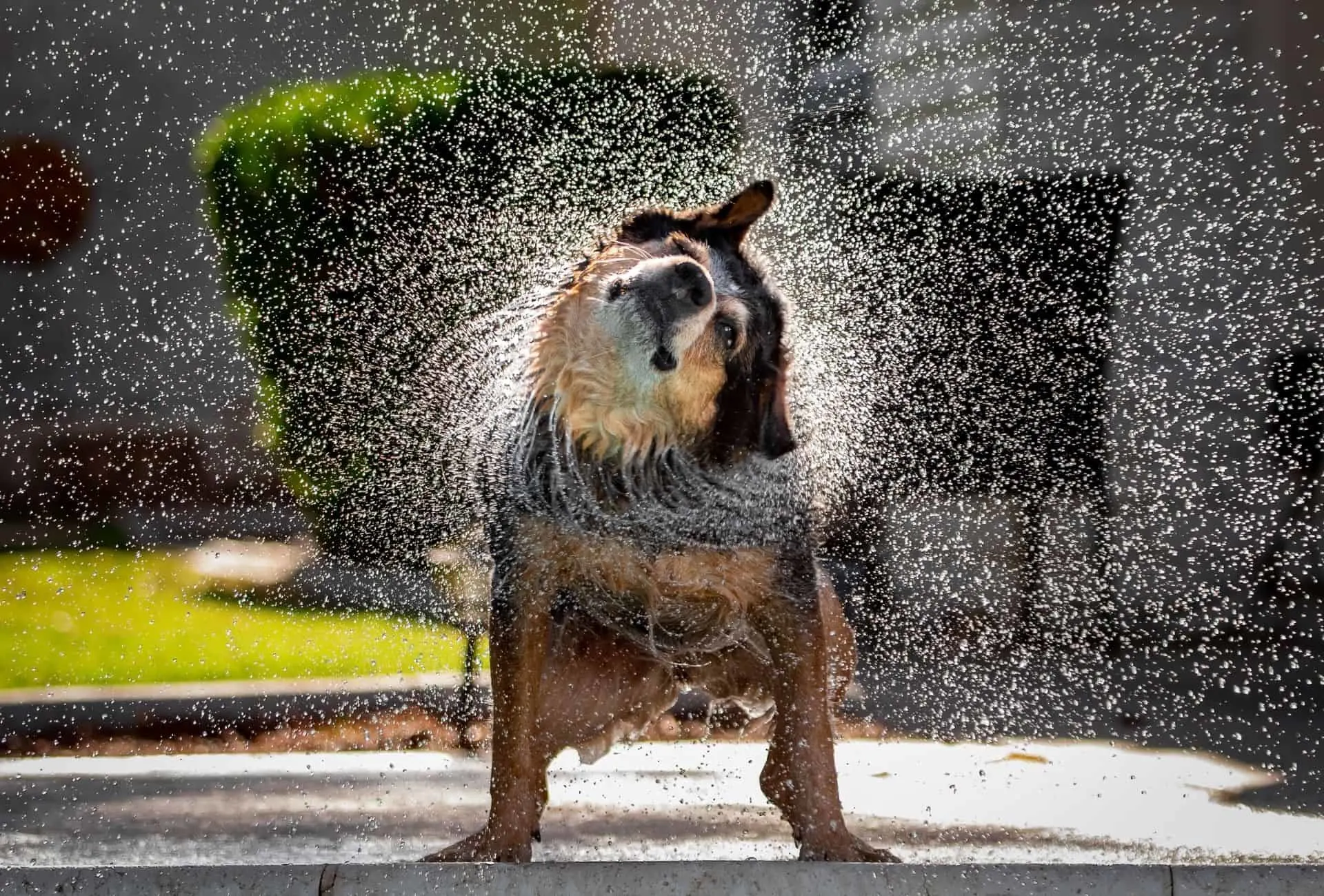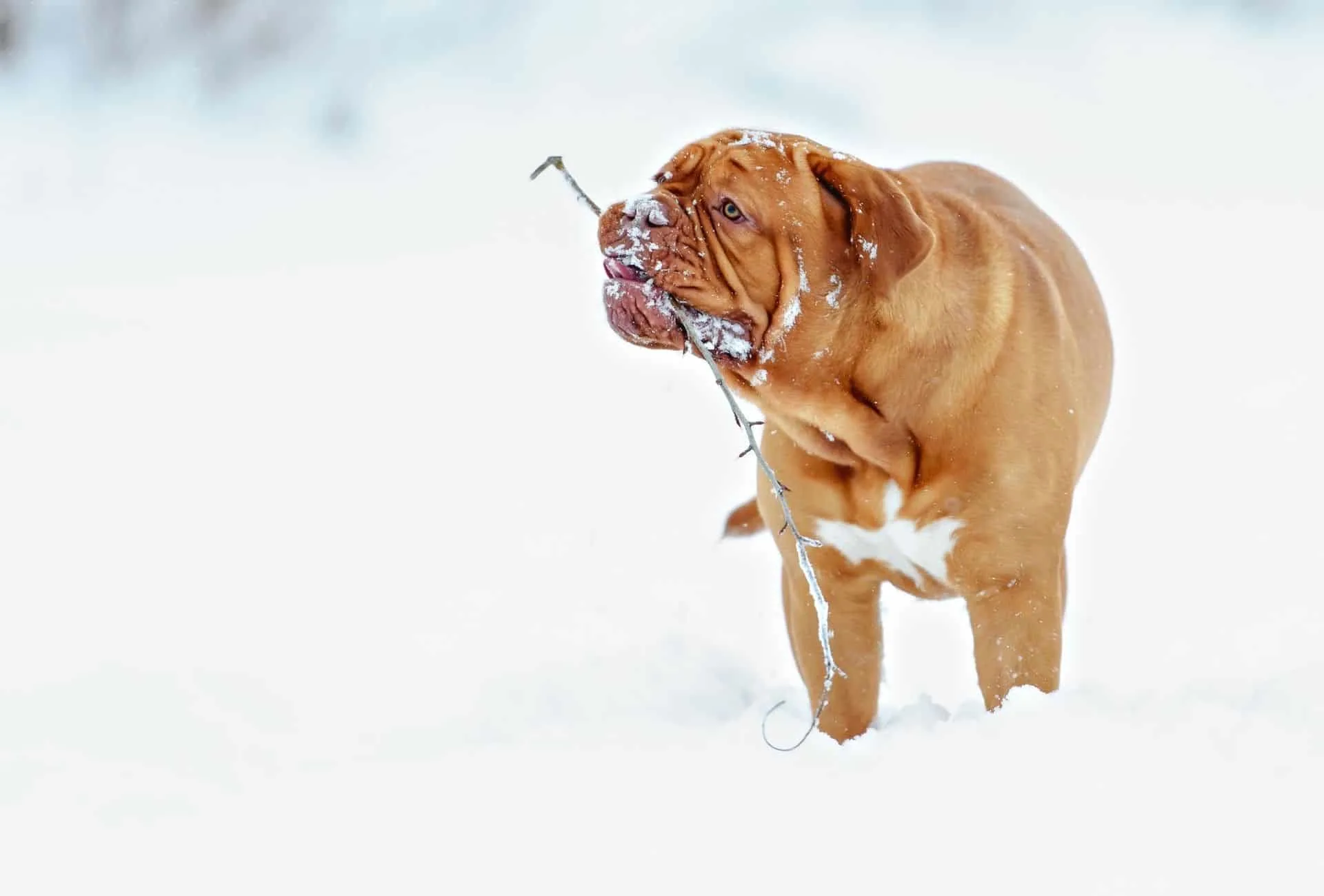Anyone who has ever bathed a dog knows the need to step well away when they come out of the water.
But drying off after a bath or swim is only one reason why your dog may shake his whole body.
Let’s check out all the reasons why dogs can shake their whole body, some of these may give you a clue to how your dog is really feeling.
9 Reasons Why Your Dog Shakes His Whole Body
Besides drying, the reasons dogs shake their whole body include feeling cold, excitement, and shaking off dirt after rolling. Medical issues or an expression of anxiety or fear are also possible.
Drying Off
We all know about this one. As mentioned above, dogs shake to remove water from their coats.
It’s very efficient and very clever, as scientists have discovered they remove 70% of the water from their coats in a fraction of a second.
Waking Up

Many dogs when they wake from a nap or first thing in the morning go through a waking up routine.
It’s not much different to us when we awake.
Dogs often yawn, have a stretch, and then a good shake, it just makes ’em feel ready for the next part of their day.
It’s a great way to wake up all their muscles and lose the last of the sleepy feeling throughout their bodies.
Feeling Cold
Dogs are warm-blooded and produce heat to keep their bodies warm from the inside, in the same way as we do.
If the temperature is cold enough to cool the dog’s body down below normal body temperature, shivering begins to increase body temperature again.
Shivering works by making repeated small muscle movements, which generate heat and increase body temperature.
After Rolling
Most dogs love a good roll. If we’re lucky it’s in grass or snow.
If not, it’s in something that smells awful to us but the dog thinks is the best thing ever.
A good full-body shake when they have finished rolling and got back to their feet gets all their fur back comfortably in place.
Excitement
Who doesn’t love to see their dog happy and excited to do something with them?
An excited dog will shiver, similar to one who is cold, but this time it’s because they just can’t hold the joy in when they see their leash, a favorite toy, or a favorite person.
Some combine excited shivering with sneezing or tap-dancing paws that leave no doubt they are looking forward to what’s coming.
During a Break In Play
Whether playing with their human family or dog friends, it’s not unusual to see a dog stop playing and have a shake.
This is a kind of emotional rebalance, to stop the game from becoming too excitable.
In playing between dogs, frequent breaks and shake-offs on both sides reassure the participants that it’s all still a game and there are no hard feelings.
Age-Related Causes
Our dogs are living longer, thanks to better veterinary care and food available.
This means we see the effects of age in our dogs more than we did previously.
As dogs grow older, there may be weaknesses in their muscles or they might develop age-related tremor conditions.
Examples of these are physiologic and essential tremor syndromes.
Medical or Physical Issues
A few canine health problems can show shivering or tremors as a symptom.

Canine distemper is one, although this is unlikely if the dog has had their vaccines.
Others include hereditary conditions in some breeds, ingesting something toxic, pain and nausea in some dogs, and epilepsy, in which the dog has seizures.
Brain injury, through trauma or a stroke, can also cause tremors.
Ear infections can also cause head tilting and shaking.
Stress, Fear, and Anxiety
One of the most common reasons for a dog to shake his whole body is stress.
Anxiety, fear, and associated stress cause chemical reactions in the dog’s body.
Adrenaline and cortisol released into the bloodstream put the fight or flight response into action.
When the stressful situation is over, the dog will often have a big full body shake, as if shaking off the negative emotions.
Why Does My Dog Shake Off When He’s Not Wet?
In the list of reasons above, only one involves a dog shaking when wet.
There are several reasons why a dog who is not wet might shake off. Next, we will take a closer look at them.
- Excitement: Most dogs love getting out of the house and going for a walk. Often they show this by shivering in anticipation when they see us move towards their leash or the treat pouch. Some dogs take this further and may sneeze, accompanied by dancing paws.
- On waking: A full body shake oftentimes follows a yawn and a big stretch when dogs have just woken up.
- In cold temperatures: Some people use shaking as a synonym for what others call shivering. Dogs are warm-blooded and when they get cold, their body shivers in an attempt to produce heat in the body.
- Health: Some medical or physical conditions can have shivering as a symptom. At the most severe end of the scale are seizure conditions like epilepsy, but shivering can also occur in other health conditions.
- After rolling: A good roll is something many dogs enjoy. What they roll in can vary – hopefully grass but sometimes something smellier. When finished, they can frequently be seen enjoying a good shake once back on their feet.
- Old age: Senior dogs are often affected by tremors or muscle weakness that can cause our furry friends to shake.
- Stress: A full-body shake-off is something we often see from our dogs following something they don’t like. How many times have we seen a dog have a good shake after coming out of the veterinarian’s office? The dog is almost shaking off all the negative emotions from the experience they just have had so they can carry on happily with their day.
- During play: Dogs playing is a wonderful thing to watch. Whether they are playing with us or with other dogs, at the end of the game or as a short break before carrying on dogs will commonly have a good shake.
Should I Be Worried If My Dog Is Shaking?
Nobody knows your dog as well as you do.
If you can see that your dog is excited, playing, rolling, or has just woken up then there’s nothing to worry about seeing them shake their whole body.
The same is true if the dog has been somewhere they don’t like, such as the vet’s office, and shake off their body once outside.
Your dog is cold? Take them somewhere to warm up.
If nothing is done against the cold, they may be going into hypothermia and need urgent veterinary care.
In case your dog seems scared of something you can see or hear that is causing them to shake with fear, taking them away from that trigger will help them feel better.
If there is no obvious cause you can identify, the first step is to rule out any health or pain problems.
Schedule a trip to the vet’s office so they can check your dog’s health.
If all is well physically, then talking to a qualified and experienced behaviorist will help to find the cause of the shaking.
My Dog Is Shaking and Acting Weird
As your dog’s owner, you will know him best and notice any changes in his behavior.
A dog shaking his whole body and acting weird is a dog who needs veterinary help.
This behavior may indicate the dog is feeling ill, is in pain, or is feeling very stressed.
Dog Is Shaking and Panting
The most common thing to see in a dog alongside shivering or shaking their whole body is panting.
Heavy panting, especially when the dog is not hot or exercised, is a sign that the dog is stressed for some reason.
Things that cause stress in dogs can include feeling ill, being in pain, or being around something that makes them anxious or scared.
Common things that scare dogs are noises like thunderstorms or fireworks but also environmental changes like moving houses can leave them feeling more anxious.
How Do You Calm a Shaking Dog?
The best way to calm a dog so upset they are shaking their whole body is to get them away from what is triggering them.
This is easy if you can pinpoint the cause.
Your dog may take a quick peek at something and then turn their head away but keep their eyes towards the thing bothering them, showing a lot of white.
For dogs shaking due to fear of noises, make a safe area for them to go in the quietest spot possible.
A safe den for them to hide in can help a lot. Anxiety wraps can aid in making the dog feel better.
Specific canine ear protectors are available. Research has shown that music can also help.
Always speak to a shaking dog in a soft, calm voice and let them be where they are most comfortable.
Over time you can use counter conditioning to take away the fear by exposing them to their trigger slowly and gradually in a positive manner.
Disclaimer: This blog post does not substitute veterinary attention and does not intend to do so. I am not a veterinarian or pet nutritionist. If your dog shows any sign of illness, call your vet.